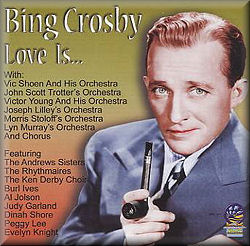1. Pistol Packin' Mama
2. On Top of Old Smoky
3. There's a Small Hotel
4. These Foolish Things
5. I Love You
6. The One I Love Belongs to Somebody Else
7. Symphony
8. Ballerina
9. When You Wore a Tulip and I Wore a Big Red Rose
10. You Are Too Beautiful
11. People Will Say We're in Love
12. I Can Dream, Can't I?
13. Mine
14. The Spaniard That Blighted My Life
15. September Song
16. Day by Day
17. On a Slow Boat to China
18. It Could Happen to You
19. How It Lies, How It Lies, How It Lies
20. To See You Is to Love You
21. Harbour Lights
22. All Through the Day
23. It's Only a Paper Moon
24. You Don't Have to Know the Language
25. Now Is the Hour (Maori Farewell Song)
26. But Beautiful
Guests
Al Jolson - Tracks #6, 14
Andrews Sisters - Tracks #1, 12, 24
Burl Ives - Track #2
Dinah Shore - Track #11
Evelyn Knight - Track #19
Judy Garland - Tracks #9, 13
Peggy Lee - Track #17
Vocal Accompaniment
Ken Derby Choir - Track #25
Lyn Murray Chorus - Track #21
The Rhythmaires - Tracks #2, 8, 16, 22
Unknown - Track #19
Musical Accompaniment
John Scott Trotter's Orchestra - Tracks #2, 5, 6, 8, 9, 12, 17, 18, 20, 25, 26
Joseph Lilley's Orchestra - Track #13
Lyn Murray's Orchestra - Track #21
Morris Stoloff's Orchestra - Track #14
Unknown - Tracks #3, 4, 10, 11, 15, 16, 19, 22, 23
Vic Schoen's Orchestra - Tracks #1, 24
Victor Young and His Orchestra - Track #7
In an interview, Crosby once said, "I have just an ordinary voice. Anyone who can carry a tune thinks he can sing as good as I do." Although he became a superstar of his era, he never acted like one, and Everyman was always able to identify with Crosby and, indeed, believe that he could "sing as good" as Bing. Crosby's voice timbre also allowed for that notion, being baritone which could also, if required, descend to the bass register or rise to the tenor, but it never came close to operatic quality. All of that, coupled with the unhurried, relaxed, "laid back" mien that Crosby carefully cultivated, undoubtedly led the average Joe to imagine, as he was singing in the shower, he was "as good as" Crosby.
All of the songs on this recording exemplify that warm, "comfortable" voice that was Crosby's. One can visualize the heavy-lidded eyes, the smile around the pipe in his mouth, the hat pushed back a little above the brow. He would stroll, not run. Nothing was ever frantic with Der Bingle. None of the songs in this CD's playlist remotely suggest loss of control or anger, even The Spaniard That Blighted My Life, where the humor of the comic interplay between Crosby and Jolson defuses any stress the lyrics might otherwise suggest.
Many of the tracks are from radio shows, either Crosby's own radio show (nine) or that of the American Forces Radio Network (AFN) or the American Forces Radio and Television Service (AFRTS), here denoted as "Basic Musical Library" (eight). Few dates are given for the Crosby shows, and none are given for the "Basic Musical Library" ones. The dating throughout is very spotty, and the best that can be said is that all of the tracks seem to place between 1943 and 1951.
On many of the cuts, guests trade verses or choruses with Crosby, on occasion singing duets with him, often in harmony-for instance Crosby with Judy Garland on When You Wore a Tulip and I Wore a Big Red Rose or with Dinah Shore on People Will Say We're in Love. The John Scott Trotter Orchestra (complete with string section), which was Crosby's chosen accompaniment for seventeen years, appears on no fewer than eleven tracks.
All of the songs, as might be expected from the CD's title, pertain
to love in all its guises, even if tangentially as in [Dance,]
Ballerina [,Dance]. Most of them will be quite familiar
to fans of pop songs of the pre-rock era; only a few have faded, although
they were quite popular in their time. So this mélange of renditions,
some 70+ minutes' worth, from the Old Groaner when he was still in
his prime should please his fans and anyone who is interested in the
pop songs of the forties and early fifties.
Bert Thompson
